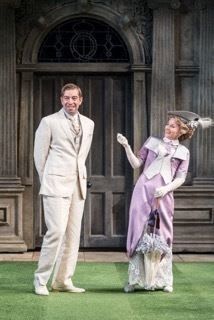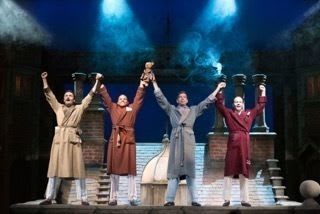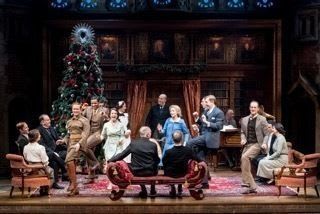These plays were first matched together in 2014 when it was noticed that they had so many similarities—sparring couples, witty dialogue, and many of the same characters—and it was thought that they might have been intended one to follow the other. Here, Christopher Luscombe directs both plays with a single company of actors setting them before and after the First World War and, although it’s not necessary to see the two together, it’s interesting to do so and compare.
A magnificent and imposing set, designed by Simon Higlett, is a facsimile of Charlotte Park, a National Trust property near Stratford-upon-Avon, and it seems as solid and well constructed as the original, with scene changes particularly impressive. I really liked the idea of the action still continuing while the room we have been watching slides back and disappears into darkness.
The first play Love’s Labour’s Lost conjures up a light-hearted summer of Edwardian elegance with masked balls and parties the order of the day, but the King of Navarre and three of his gentlemen are signing a contract (one very reluctantly) to spend three years concentrating on their studies and avoiding all women. A fine time for the Princess of France to arrive with her three gorgeous (and sumptuously gowned) ladies, and no prizes for guessing what happens next.
There is a great deal of word play in this wonderful witty production as well as a couple of uproariously funny highlights. The ladies fool the men by changing "favours" at a masked ball, but the men pull a better stunt and their very impressive Cossack dance has the audience in stitches. The episode with the men on the rooftop just has to be seen. Brilliantly (and athletically) performed and laugh out loud hilarious.
Sadly, the laughter has to cease as, now uniformed, the men march off to war, but in Much Ado About Nothing they return, slightly older, possibly wiser and in one case bitterly resentful. Well they are not the same people but so close to their counterparts except in name that it’s easy to see a connection between the two plays.
Lisa Dillon and Edward Bennett are the sparring couple in both plays, a little more outspoken and forthright in the second one, but Sam Alexander, previously the king, is now Don John, the embittered illegitimate brother, walking with a crutch and so resentful of the war hero Claudio (Tunji Kasim) he’s determined to ruin his wedding day.
What I found particularly interesting about these two plays is that in the first it is the ladies who have the upper hand, having fooled the men so beautifully and ending up giving them an ultimatum, whereas in the second it is the men who rule, and who could approve of Claudio rejecting and humiliating his betrothed on hearsay and happy to marry another—chosen by another man. Was Shakespeare becoming more cynical when he wrote Much Ado?
Music plays a large part in the production and composer Nigel Hess has echoed the musical styles of the period from music hall ditties to ragtime, enhancing the mood as appropriate, and there is some very good singing from Peter McGovern and especially from Harry Waller as Balthasar, the piano playing singing guest at the party and reminiscent of Noël Coward.
The choice of these two plays, so flawlessly performed and presented, is a superb finish to this year’s Festival Programme, the last one with Jonathan Church and Alan Finch at the helm.


